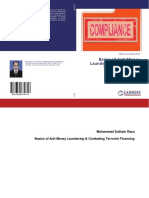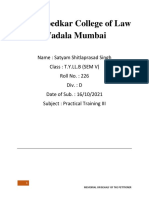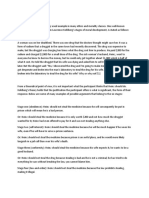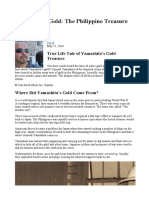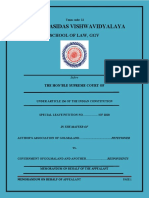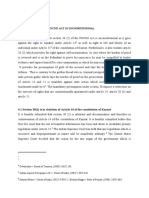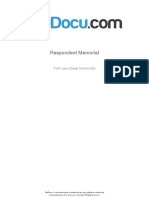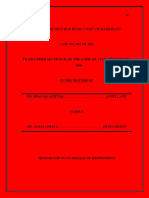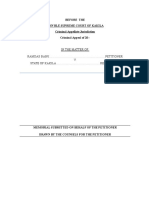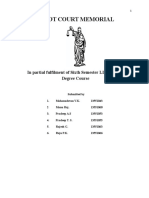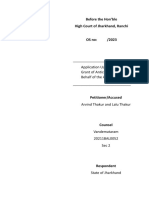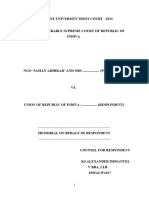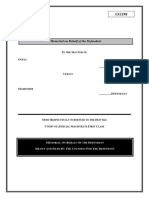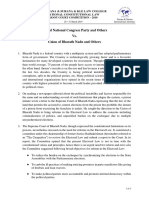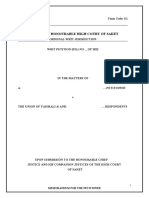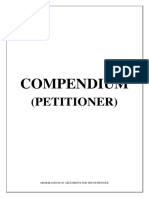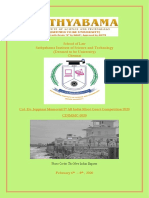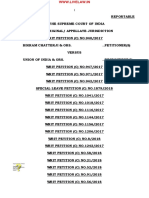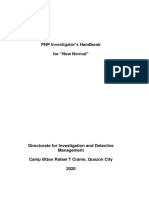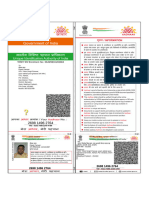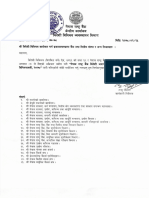Amity - Respondent 2
Amity - Respondent 2
Uploaded by
Radha SundarCopyright:
Available Formats
Amity - Respondent 2
Amity - Respondent 2
Uploaded by
Radha SundarOriginal Description:
Original Title
Copyright
Available Formats
Share this document
Did you find this document useful?
Is this content inappropriate?
Copyright:
Available Formats
Amity - Respondent 2
Amity - Respondent 2
Uploaded by
Radha SundarCopyright:
Available Formats
TEAM CODE: R2
16TH AMITY NATIONAL MOOT COURT COMPETITION
BEFORE THE HON’BLE SUPREME COURT OF VISCARA
Criminal Appeal No.1234/2017
EVERT GULLBERG ..............................................................APPELLANT
VERSUS
ENFORCEMENT DIRECTORATE & ORS................................RESPONDENT
With SLP (Crl) 9999 of 2015 SLP (Crl) 2431 of 2014 TC (Crl) 313 of 2016 TC (Crl) 314 of 2016
Most Respectfully Submitted to the Hon’ble Judges of the Supreme Court of Viscara
CORAM:
HON'BLE MR. JUSTICE PATRICK STEWART
HON'BLE MR. JUSTICE JIM PARSONS
Counsels appearing on behalf of the Respondent
TABLE OF CONTENTS
S.NO CONTENTS PAGE NO
1. TABLES OF CASES 3,4
2. JURISDICTION
3. ISSUES
4 SUMMARY OF ARGUMENTS
5 ARGUMENTS ADVANCED
6. PRAYER
-MEMORANDUM ON BEHALF OF THE RESPONDENTS- 2
TABLE OF CASES
S No. CASE TITLE Pg No.
1. Amrit Banaspati Ltd v. Union of India, AIR 1995 SC 1340 at 1343 16
2. Bachan Singh v. State of Punjab, AIR 1982 SC 1325 16
3. Bombay v. F.N. Balsara, AIR 1951 SC 318 16
4. B.R. Enterprises v State of Uttar Pradesh Air 1999 SC 1867 17
5. Calcutta Discount Company v. Income Tax Officers 1961 SCR (2) 241 12
6. Charanjit lal Chowdhary v. Union of India, AIR 1951 SC 41 16, 17
7. Delhi Cloth and Gen. Mill Co. Ltd. V. Union of India, AIR 1983 SC 17
937
8. Delhi Transport Corporation v. D.T.C. Mazdoor Congress, AIR 1991 16
SC 101
9. Emperor v. Vimlabai Deshpnde (10 AIR 1946 PC 123) 9
10. Income Tax Officer v. Lakhmani Mewal Das 1976 SCR (3) 956 14
11. Janta jha v. Assistant director 2014 criLJ 2556 13
12. K.Munivelu v. Government of India and ors AIR 1972 AP 318 11
13. Kedar Nath v. State of Bihar AIR 1962 SC 955 17
14. Mahant Moti Das v. S.P. Sahi, AIR 1959 SC 942 16
15. Mylapore Club v. State of Tamil Nadu (2005) 12 SCC 752 16
16. Ram Krishna Dalmia v. S.R. Tendolkar, AIR 1958 SC 638 16
17. Ratan Lal v. State of Punjab, AIR 1965 SC 444 15
18. Shah v. State of Gujarat 19
19. Smt.K.Sowbaghya v. Union Of India 18
20. Sri P. Trivikrama Prasad v. Enforcement Directorate, 2014 AP 21124 15
21. State of Andhra Pradesh v. McDowell & Co., AIR 1996 SC 1628 at 16,17
1641
22. State of West Bengal v. S.N.Basak (1963) 2 SCR 52 9
23. Talab Haji Hussain v. Madhukar Purushottam Mondkar (1958) SCR 9
1226
-MEMORANDUM ON BEHALF OF THE RESPONDENTS- 3
24. United states v. Cortes 9
25. Vrajlal Manilal & Co. v. State of Madhya Pradesh, AIR 1970 SC 129 16
26. District judge v. Union of India, 2014 SCA 645 14
-MEMORANDUM ON BEHALF OF THE RESPONDENTS- 4
JURISDICTION
It is most humbly submitted that the respondents have appeared before the Hon'ble Supreme
Court of Viscara under the Jurisdiction of the Appellants
-MEMORANDUM ON BEHALF OF THE RESPONDENTS- 5
ISSUES
ISSUES: 1
Whether the FIR dated 12th February 2016 ought to be quashed?
ISSUES: 2
Whether the Provisional Attachment and freezing order dated 1st March 2015 is valid?
ISSUES: 3
If the second issue is answered in the affirmative, then is the second Provisional Attachment
order dated 1st September 2015 valid and permissible under law?
ISSUES: 4
Whether Sections 2(u), 2(v), 3 and 5 of the PMLA are arbitrary and volative of Articles 14 and
300-A of the Constitution and liable to be struck down?
-MEMORANDUM ON BEHALF OF THE RESPONDENTS- 6
SUMMARY OF ARGUMENTS
Whether the FIR dated 12th February 2016 ought to be quashed?
It is humbly submitted before this hon’ble court that the FIR dated 12th February 2016 ought
not to be quashed. As it does not satisfy the conditions of when the FIR can quashed and all
conclusive statements are against the appellant
Whether the Provisional Attachment and freezing order dated 1st March 2015 is valid?
It is humbly submitted before this hon’ble court that the Provisional Attachment and freezing
order dated 1st March 2015 is valid as per section 5 of the PALM act and there is nexus
between the offence and the alleged offence and the provincial attachment
If the second issue is answered in the affirmative, then is the second Provisional
Attachment order dated 1st September 2015 valid and permissible under law?
It is humbly submitted before this The second provisional attachment Attachment order
dated 1st September 2015 valid and permissible under law as per section 8 of the PMLA.
WHETHER SECTIONS 2(u), 2(v), 3 AND 5 OF THE PMLA ARE ARBRITRARY AND
VIOLATES ARTICLES 14 AND 300-A OF THE CONSTITUTION AND LIABLE TO
BE STRUCK DOWN?
It is humbly submitted before this the said section cannot be struck down as per the rule of
presumption of constitutionality and the said section does not violate the principle in anyway
nor it violates article 300 A
ARGUMENTS ADVANCED
-MEMORANDUM ON BEHALF OF THE RESPONDENTS- 7
1. WHETHER THE CONDITIONS ARE SATISFIED FOR FIR TO BE
QUASHED?
In the backdrop of the interpretation of the principles of law enunciated by courts in a series
of decisions relating to the exercise of the extraordinary power under article 226 or the
inherent powers under section 482 of the code, in order to secure justice, certain principles
are clearly defined and sufficiently channelized in myriad of cases. The 7 main conditions
propounded in various judgements compiled together are -
1.1. Where the allegations made in the first information report or the complaint, even if
they are taken at their face value and accepted in their entirety do not prima facie
constitute any offence or make out a case against the accused.1
1.2. Where the allegations in the first information report and other materials, if any,
accompanying the FIR do not disclose a cognizable offence, justifying an investigation by
police officers under Sec. 156(1) of the Code except under an order of a Magistrate within
the purview of Sec. 155(2) of the Code.
1.3. Where the uncontroverted allegations made in the FIR or complaint and the evidence
collected in support of the same do not disclose the commission of any offence and make
out a case against the accused.
1.4. Where, the allegations in the FIR do not constitute a cognizable offence but constitute
only a non-cognizable offence, no investigation is permitted by a police officer without an
order of a Magistrate as contemplated under Sec. 155 (2) of the Code.
1.5. Where the allegations made in the FIR or complaint are so absurd and inherently
improbable on the basis of which no prudent person can ever reach a just conclusion that
there is sufficient ground for proceeding against the accused.
1.6 Where there is an express legal bar engrafted in any of the provisions of the Code or
the concerned Act (under which a criminal proceeding is instituted) to the institution and
continuance of the proceedings and/or where there is a specific provision in the Code or
the concerned Act, providing efficacious redress for the grievance of the aggrieved party.
1
State of U.P v. VRK Srivastava ( 1989) SCC (Cri) 713
-MEMORANDUM ON BEHALF OF THE RESPONDENTS- 8
1.7 Where a criminal proceeding is manifestly attended with mala fide and/or where the
proceeding is maliciously instituted with an ulterior motive for wreaking vengeance on the
accused and with a view to spite him due to private and personal grudge.2
2.It is humbly put before this hon’ble court that First Information Report filed by the
Respondent is in compliance with law and its not satisfying any of the above conditions
enunciated by various precedents.
3.When the Ollsen police intercepted the vehicle of Mr. Gullberb suspecting him of having
stolen the periscope painting (according to the complaint registered by Ms.Bennet) they
found unrecorded 100kg Gold and as per procedure they duely arrested Mr.Gullberg.
4.We would like to bring your kind attention that Mr.Gullberg is a successful business
magnet owning tea estate and “Gullberg jewellers”. And when we correlate the fact that
“gold” was found in his car, with the type of business he does including the fact that when
documents were leaked from Marzipan –“marzipan diaries”, his name was one among the
several names listed in it, it is obvious to suspect him of committing the crime.
5.It is humbly submitted that ‘reason of suspect’ is the basis for filing the first information
report and when they recovered 100kgs of gold from a business man who deals in jewellery ,
it is simply a belief or opinion as to guilt, based on facts and circumstances which do not
amount to proof but can be used to build the future case.3 Reason to suspect has to be
governed and dictated by the facts and circumstances of each case and at the stage the
question of alleged crime as reported in the FIR and the evidence collected need not
necessarily contribute to same offence.4
6.Hence reason to belief is the prima facie in this case. Even though the search was in relation
with the periscope painting, its illogical on side of petitioner to claim the quashing of order
just because the search and seizure objective were different and the same was held rightly by
Hon’ble High court of Ollsen by refusing to quash the FIR. Moreover, the uncontroverted
allegations made in the FIR or complaint and the evidence collected in support of the same do
disclose the commission of any offence and make out a case against. Mr.Gullberg based on
2
State of West Bengal v. S.N.Basak (1963) 2 SCR 52; Talab Haji Hussain v. Madhukar Purushottam Mondkar
(1958) SCR 1226.
3
Emperor v. Vimlabai Deshpnde (10 AIR 1946 PC 123)
4
United states v. Cortes
-MEMORANDUM ON BEHALF OF THE RESPONDENTS- 9
the facts of the case.5 It is also humbly submitted that when above laid condition are not in co
relation with the present case at hand and thus it is very evident from the above facts that
Mr.Gullberg involved himself in activities barred by section 135 of the customs act and thus
the FIR is ought not to be quashed
7.In the light of the above arguments, we humbly submit before this Hon’ble court that the
respondents are clothed with legal authority and hence the search and seizure is in accordance
with the law established.
2. WHETHER THE FREEZING ORDER AND PROVISIONAL ATTACHMENT
MADE ON 1st JUNE, 20166 IS VALID?
8.It is humbly submitted before this hon’ble court that the provisional attachment and the
freezing order made on 1st June, 2016 is valid. Once a complaint is received by the
Enforcement Directorate that a person is involved in money laundering, the Enforcement
Directorate sets in motion the investigation on the allegations of money laundering against
the person. Chapter-II of the Act prescribes offence of money laundering and the punishment
thereof. The act also vests power in the Enforcement Directorate to attach the property
involved in money laundering, which is liable to be confiscated if the charge of money
laundering is proved. It is possible for the person to completely dispose of the properties
which are acquired by committing crime of money laundering, and also can conceal or deal
with such property, which would ultimately frustrate the proceedings for confiscation under
the Act. Hence, the provisional order passed on 1st June, 2016 against the assets and
properties of Mr.Gullberg is valid.
2.1. WHETHER PROVISIONAL ATTACHMENT DATED 1st JUNE, 20167 IS
VALID?
5
Moot problem page 2 para 7 line 1-7
6
Moot Proposition Para No.13
7
Moot Proposition Para no.13
-MEMORANDUM ON BEHALF OF THE RESPONDENTS- 10
9.It is humbly submitted before this hon’ble court that the Enforcement Directorate had
sufficient reason to believe to issue the provisional order and the freezing order on 1st June,
2016. An ED attachment is an enforcement action under anti-money laundering laws to
restrict the accused from taking benefit out of the properties or assets they have
created/earned through illegal means.
Section 5 of the money laundering act states that,
(1) Where the Director, or any other officer not below the rank of Deputy Director
authorised by him for the purposes of this section, has reason to believe (the reason for
such belief to be recorded in writing), on the basis of material in his possession, that—
(a) Any person is in possession of any proceeds of crime;
(b) Such person has been charged of having committed a scheduled offence; and
(c) Such proceeds of crime are likely to be concealed, transferred or dealt with in any
manner which may result in frustrating any proceedings relating to confiscation of such
proceeds of crime.
10.The expression “Reason to Believe” has not been defined under the PMLA Act. However,
it has been defined under Section 26 of the Viscara Penal Code, 1860 which states that “a
person is said to have "Reason to Believe" a thing, if he has sufficient cause to believe that
thing but not otherwise”. The expression “Reason to Believe” has been used in several Indian
statutes and the said expression has been a subject matter in various decisions of the Supreme
Court. As stated in the case of K.Munivelu v. Government of India and ors,8
11."Reason to believe" is a much stronger expression than the word "suspect". it is
observed from the meanings attributed to the words "suspect" and "Reason to Believe",
that it is evident at the initial stage when there is a belief for the existence of a certain thing
or an alleged fact, such belief will amount to suspicion. After the stage of suspicion, where
it is found that there exists a thing, condition or a statement of fact, one moves towards
collecting information and then examine that information and reach on a final conclusion,
on the basis of that information, that there exists such a thing, condition or statement of a
fact. All these ingredients are prerequisite for forming any opinion based on "Reason to
Believe"
8
AIR 1972 AP 318
-MEMORANDUM ON BEHALF OF THE RESPONDENTS- 11
In the case of Calcutta Discount Company v. Income Tax Officers9 it was held that,
“The expression "Reason to Believe" postulates belief and the existence of reasons for that
belief. It cannot be merely pretence. The expression does not mean a purely subjective
satisfaction”
12.In this case, the initial stage when there is a belief for the existence of the offence
committed by Mr.Gullberg is established when the Enforcement Direcotorate filed an ECIR
based on the information provided by the police.10 In the subsequent investigation by the
Enforcement Directorate, it was found that Mr.Gullberg had opened and closed 11 bank
accounts between 1st January 2014 and march 2016 sufficing the suspicion raised against
Mr.Gullberg on the events of 12th February, 2016. Based on the information collected, it was
found that Mr.Gullberg had also deposited and withdrawn VNR 100 crore in cash,11
satisfying all the prerequisites as stated supra. The reason to believe established by the
Enforcement Directorate is not merely a pretence but based on the information collected
subsequent to the investigation conducted by the Enforcement Directorate.
13.Thus the provisional order and the freezing order dated 1st June, 2016 is valid as the
reason to believe had been established by the Enforcement Directorate.
2.1.1. WHETHER THERE IS ANY NEXUS BETWEEN THE OFFENCE ALLEGED
AND THE PROVISIONAL ATTACHMENT?
14.It is humbly submitted before this hon’ble court that there is a clear nexus between the
offence alleged and the provisional attachment. Mr.Gullberg is a successful businessman
owning a jewellery business in the state of Ollsen.12 On 12th February, 2016 an FIR was filed
against his name under section 135 of the customs Act, 1962 after 100 kg of unaccounted
gold was recovered from Mr.Gullberg’s car. The case was later transferred to the
Enforcement Directorate in purview of section 3 of the Prevention of Money Laundering Act,
2002.
Section 3 states that,
9
1961 SCR (2) 241
10
Moot Proposition Para no.10
11
Moot Proposition Para no.12
12
Moot Proposition Para no.3
-MEMORANDUM ON BEHALF OF THE RESPONDENTS- 12
14.Whosoever directly or indirectly attempts to indulge or knowingly assists or knowingly is
a party or is actually involved in any process or activity connected with the proceeds of
crime and projecting it as untainted property shall be guilty of offence of money-
laundering.
15.Hence, under the purview of section 3 of Prevention of Money Laundering Act, the
offences alleged under sections 135 of the customs act and under sections 384-386 and 392 of
the Viscara penal Code, 1860 falls under scheduled offence. Investing agency under the
PMLA has an independent power to investigate the allegations, irrespective of the fact that
the FIR on the basis of which the ECIR was registered is in existence or not.13 The
Enforcement Directorate is legally clothed to issue a provisional order under section 5 of the
Prevention of money Laundering Act.
16.Thus it is humbly submitted before this hon’ble court that the nexus between the offence
alleged and the issuance of provisional attachment has been established.
2.2. WHETHER THE FREEZING ORDER ON THE BANK ACCOUNTS OF
Mr.GULLBERG VALID?
17.The freezing of Mr.Gullberg’s bank accounts in marzipan is valid since it comes under the
purview of proceeds of crime and shall not be interfered with and frustrate the PML Act.
18.The freezing order given under section 17(1-A) of the PMLA is a temporary measure to
ensure the proceeds of crime shall not be displaced during the time of investigation. Section
2(u) defines "proceeds of crime" so as to mean derivation or obtaining of any property or it
value directly or indirectly by any person as a result of criminal activity relating to a
scheduled offence.14
19.Under sub-section (1-A) of Section 17 of Prevention of Money Laundering Act, freezing
orders of properties can be passed if seizure is not practicable.
20.Section 17 authorizes a search and seizure can be initiated on the basis of information in
possession of searching or seizing officer as also on the basis of belief, which has to be
recorded in writing, that any person has committed any act.15 Such reason to belief should not
13
Janta Jha v. Assistant director 2014 criLJ 2556
14
Prevention of Money Laundering Act, 2002
15
5 whether it is to be circulated to District judge v. Union of India, 2014 SCA 645
-MEMORANDUM ON BEHALF OF THE RESPONDENTS- 13
merely be a suspicion.16 The Enforcement directorate has established the grounds for belief
on the grounds of the findings on their initial investigation.17 A freezing order under section
17(1-A) is prima facie permissible. The prima facie evidence in this case is the opening and
closing of 11 bank accounts which had been deposited with VNR100crore and was later
withdrawn and the seizure of 100kg gold from Mr.Gullberg’s car.18
21.Hence, the freezing order passed against Mr.Gullberg’s bank account is only for the
protection of the proceeds of crime from displacing or destroying the evidence.
22.It is most humbly submitted before this hon’ble court that the provisional attachment and
the freezing order dates 1st June, 2016 is valid on the grounds of being a temporary measure
to prevent the disposal of evidence of proceeds of crime and the nexus established between
the offences alleged and the provisional order. Thus, it is most humbly submitted that the
judgement passed by the High Court of Ollsen on the Writ Petition, being W.P. (Crl)
No.2222 of 2016 be upheld.
3. IF THE SECOND ISSUE IS ANSWERED IN AFFIRMATIVE, THEN IS THE
SECOND PROVISIONAL ATTACHMENT ORDER DATED 29th
NOVEMBER, 201619 VALID AND PERMISSIBLE UNDER LAW?
23.It is humbly submitted before this hon’ble court that the second provisional order dated
29th November is valid. Section 8 mandates that any provisional attachment order made
under Section 5 (1) of the Prevention of Money Laundering Act, 2002 would only remain
valid up to 180 days. After 180 days when the provisional order cease to have any effect, a
subsequent provisional attachment can be issued provided the conditions under section 8(3)
are satisfied. If the adjudicating authority confirms the order and holds that the property is
involved in money laundering, he could confirm the attachment order, if the conditions
under Section 8(3) are satisfied.
24.The order of confirmation of provisional attachment shall be passed, provided the order of
attachment shall:
16
Income Tax Officer v. Lakhmani Mewal Das 1976 SCR (3) 956
17
Moot Proposition Para no.12
18
Moot Proposition Para no.11
19
Moot Proposition Para no.19
-MEMORANDUM ON BEHALF OF THE RESPONDENTS- 14
a) Continue during the pendency of the proceedings relating to any Scheduled offence before
the court and
b) Would become final after the guilt of the person is proved before the trial court and the
order of the trial court becomes final.
25.Since the scheduled offence alleged had not been proved against Mr.Gullberg and is in the
investigation stage it is premature to go into the validity of power exercised by the
Enforcement Directorate under Section 5(1)20 and it would amount to prejudging the issue
and scuttling adjudicating process engrafted into the statute and nullify the very scheme of
the act. A detailed procedure is envisaged by the Act and any interference at this stage would
amount to scuttling this procedure.21 The proceedings of attachment of property are
independent of the proceedings for the offence of money-laundering or the scheduled
offence. Any property, if involved in the money laundering offences, would be liable to
attachment and confiscation irrespective of whether it remains in the name of the accused
persons or other persons. Section 3 of the Act covers all purchases of moveable and
immovable property inducting or integrating proceeds of crime.22
3.1. WHETHER THE ENFORCEMENT DIRECTORATE WAS ACTING WITHIN
THEIR POWERS?
26.It is humbly contended before this hon’ble court that the Enforcement Directorate was
acting within its powers vested on it by the Prevention of Money Laundering Act, 2002.
27.Article 51 of the Constitution of Viscara has provided for the state to uphold and foster
international law and treaty obligation. In pursuance to the political Declaration adopted by
the special session of the United Nations General Assembly (UNGASS) held on 8th to
10th June 1998 of which Viscara is a Signotary to, calling upon member States to adopt Anti
Money Laundering Legislation & Programme, the Parliament enacted a special law called the
Prevention of Money Laundering Act, 2002 in correspondence Article 253 of the constitution
which empowers the legislation to give effect to international agreement. This Act has been
substantially amended, by way of enlarging its scope, in 2009 (w.e.f. 01.06.2009), by
enactment of Prevention of Money Laundering (Amendment) Act, 2009. The main objective
of this act is to prevent money laundering and vest power with the Enforcement Directorate
20
Prevention of Money Laundering Act, 2002
21
Sri P. Trivikrama Prasad v. Enforcement Directorate, 2014 AP 21124
22
Ratan Lal v. State of Punjab, AIR 1965 SC 444
-MEMORANDUM ON BEHALF OF THE RESPONDENTS- 15
to uphold the objective of this act, than to frustrate the proceedings under this Act. The
Enforcement directorate acts an instrument to prevent money-laundering and to provide for
confiscation of property derived from, or involved in, money-laundering and for matters
connected therewith or incidental thereto. Sections 48 & 49 of the PMLA, the officers of the
Directorate of Enforcement have been given powers to investigate cases of Money
Laundering. Thus by issuing a Second Provisional attachment on 29th November, 2016 the
Enforcement Directorate were acting within their powers. The provisional attachment order
issued against Mr.Gullberg’s assets was to ensure the proceeds of crime which are liable to be
confiscated if found guilty, shall not be disposed off during the investigation stage.Thus the
second provisional attachment issued by the Enforcement Directorate is within the powers of
the Enforcement Directorate.
28.Thus it is most humbly submitted before this hon’ble court that the provisional attachment
issued on 29th November, 201623 is valid and permissible under law.
4. WHETHER SECTIONS 2(u), 2(v), 3 AND 5 OF THE PMLA ARE
ARBRITRARY AND VIOLATES ARTICLES 14 AND 300-A OF THE
CONSTITUTION AND LIABLE TO BE STRUCK DOWN?
29.It is humbly submitted before the hon’ble court that the sec 2(u), 2 (v), 3 and 5 of the
PMLA are not violating article 14 and article 300 A of the Indian constitution
4.1 These said sections of the PMLA act are not liable to be struck down as per
constitutional presumption of Viscara constitution
30.The power to legislate is a plenary power vested in the legislature and unless these who
challenge the legislation clearly establish that their fundamental rights under the Constitution
are affected or that the legislature lacked legislative competence, they do not succeed in their
challenge to the enactment brought forward in the wisdom of the legislature. A statute cannot
be struck down merely because the Court thinks it to be arbitrary or unreasonable. Any such
ground of invalidity must be related to a Constitutional provision, such as, Articles 14or 21.
Challenge on ground of wisdom of legislation is not permissible as it is for the legislature to
balance various interests24 . The Legislature appreciates and understands the needs of the
people, that it knows what is good or bad for them, that the laws it enacts are directed to
23
Moot Proposition Para no.19
24
8 Mylapore Club v. State of Tamil Nadu (2005) 12 SCC 752
-MEMORANDUM ON BEHALF OF THE RESPONDENTS- 16
problems which are made manifest by experience that the elected representatives in a
legislature enact laws which they consider to be reasonable, for the purposes for which these
laws are enacted and that a legislature would not deliberately flout a constitutional safeguard
or right25. The Legislature composed as it is of the elected representatives of the people is
presumed to know and be aware of the needs of the people and what is good or bad for them
and that a Court cannot sit in judgment over the wisdom of the Legislature26. Therefore
usually the presumption is in the favour of the Constitutionality of the statute and the onus to
prove that it is unconstitutional lies upon the person who is challenging it.27 The allegations
regarding the violation of a constitutional provision should be specific, clear and
unambiguous and it is for the person who impeaches the law as violative of the constitutional
guarantee to show that the particular provision is infirm for the reasons stated by him.28 The
Courts are not concerned with the need or propriety of laws. The judicial function is not to
canvass the legislative judgement, or to hold the impugned statute to be ill-advised or
unjustified or not justified by the facts on which it is based. The function of the Courts is to
see whether the law in question transgresses any constitutional restriction imposed on the
legislature29. Therefore a law cannot be struck down merely because the court thinks it to be
unjustified or unwise30. As the Supreme Court has stated: “What form a regulatory measure
must take is for the legislature to decide and the court would not examine its wisdom or
efficacy except to the extent that article 13 of the constitution is attracted.31” It is also well
settled, first attempt should be made by the Courts to uphold the charged provision and not to
invalidate it merely because one of the possible interpretations leads to such a result,
howsoever attractive it may be.32 In Kedar Nath v. State of Bihar,33 s. 124 A of the India
Penal Code., was interpreted in the narrower sense and was thus sustained against a challenge
under Art. 19(2). Sedition was defined as meaning words, deeds or writings having a
tendency or intention to disturb public tranquillity, to create public disturbance or to promote
disorder. The Supreme Court rejected the border view of S. 124 A that incitement to public
25
Ram Krishna Dalmia v. S.R. Tendolkar, AIR 1958 SC 638; Vrajlal Manilal & Co. v. State of Madhya
Pradesh, AIR 1970 SC 129; Bachan Singh v. State of Punjab, AIR 1982 SC 1325
26
State of Andhra Pradesh v. McDowell & Co., AIR 1996 SC 1628 at 1641
27
Charanjit lal Chowdhary v. Union of India, AIR 1951 SC 41; Bombay v. F.N. Balsara, AIR 1951 SC 318;
Mahant Moti Das v. S.P. Sahi, AIR 1959 SC 942; Delhi Transport Corporation v. D.T.C. Mazdoor Congress,
AIR 1991 SC 101
28
Amrit Banaspati Ltd v. Union of India, AIR 1995 SC 1340 at 1343
29
Charanjit lal Chowdhary v Union of India AIR 1951 SC 41
30
State of Andhra Pradesh v. McDowell & Co AIR 1996 SC 1628 at 1641
31
Delhi Cloth and Gen. Mill Co. Ltd. V. Union of India, AIR 1983 SC 937
32
6 B.R. Enterprises v State of Uttar Pradesh Air 1999 SC 1867:
33
AIR 1962 SC 955
-MEMORANDUM ON BEHALF OF THE RESPONDENTS- 17
order was not an essential element of the offence of sedition under this section. This broad
view would have made s. 124A unconstitutional vis-a-vis Art. 19(1)(a) read with Art. 19(2).
4.2 The said sections of is not arbitrary to article 300A and article 14 of the Viscara
constitution
31.It is respectfully submitted that the article 14 and of the Viscara constitution states that
The State shall not deny to any person equality before the law or the equal protection of the
laws within the territory of India Prohibition of discrimination on grounds of religion, race,
caste, sex or place of birth
And article 300 A states that No person shall be deprived of his property save by authority of
law.
32.In the present case at hand the said sections of the PMLA act does not violate article 300
A and article 14,
33.On the afore-stated scheme the provisions of the Act, the prosecution under the Act; and
attachment and eventual confiscation proceedings are distinct proceedings. These two sets of
proceedings may be initiated against the same person if he is accused of the offence of
money-laundering. Even when a person is not so accused, the property in his possession may
be proceeded against for attachment and confiscation, on a satisfaction by the appropriate and
competent authority that such property constitutes proceeds of crime34. The enforcement
directorate in the present case at hand retained the painting periscope as a proceed of crime .
34. It is humbly submitted that, the provisions of the Act which clearly and unambiguously
enable initiation of proceedings for attachment and eventual confiscation of property in
possession of a person not accused of having committed an offence under Section 3 , section
2(u) , 2(v), and 5 , do not violate the provisions of the Constitution including Articles 14, and
300-A and are operative proprio vigore.
35.While the offence of money-laundering comprises various degrees of association and
activity with knowledge and information connected with the proceeds of crime and projection
of the same as untainted property; for the purposes of attachment and confiscation
(imposition of civil and economic and not penal sanctions) neither mens rea nor knowledge
that a property has a lineage of criminality is either constitutionally necessary or statutorily
enjoined. Proceeds of crime (as defined in Section 2(u) is property derived or obtained
34
Smt.K.Sowbaghya v. Union Of India
-MEMORANDUM ON BEHALF OF THE RESPONDENTS- 18
directly or indirectly as a result of criminal activity relating to a scheduled offence or the
value of any such property. "Property" is defined in section 2(v) to include property of every
description corporeal, incorporeal, movable, immovable, tangible, and intangible and
includes deeds and instruments evidencing title to or interest in such property or assets
wherever located.
36. For the definition of the phrase "proceeds of crime" read with Section 3 if construed
strictly. It can be said that having regard to the meaning attributed to 'proceeds of crime'
under the PML Act, whereby the 'crime' contemplated is the alleged scheduled offence, the
'proceeds of crime' , contemplated under Sections 3 and 4 are clearly and inextricably linked
to the scheduled offence and it is not possible to envision an offence under PML Act as a
'stand alone' offence without the guilt of the offender in the Scheduled offence being
established.
37.However, it is to be seen that proceeds of crime is "property" of all kinds as defined under
clause (v) of Section 2(1). In the present case at hand present case at hand the painting
periscope is also a property. It is humbly submitted that the said section do not violate the
article 14 and 300 A of the Viscara constitution
4.3 It does not violate the principle of natural justice:
38.In the present case at hand there was no violation of principle of natural justice as
Two core points in the concept of principles of natural justice
1.) Nemo in propria causa judex, esse debet - No one should be made a judge in his own
case, or the rule against bias.
2.) Audi alteram partem - Hear the other party, or the rule of fair hearing, or the rule that no
one should be condemned unheard
39.In the present case at hand passing of the provisional attachment order does not violate
principle of natural justice .It is clear from the provisions of Section 5(1) of the PMLA that
-MEMORANDUM ON BEHALF OF THE RESPONDENTS- 19
five conditions are prerequisite for attaching the proceeds of crime provisionally without
issuing notice prior to the attachment.35 They are:
i. The Director, or any other officer, who provisionally attaches any property, shall
have reasons to believe 36on the basis of materials in his possession;
ii. The person, against whom proceedings under P.M.L.A., 2002 has been initiated,
must be in possession of any proceeds of crime;
iii. Such person must be charged of having committed any scheduled offence;
iv. Such proceeds of crime are likely to be concealed, transferred or dealt with in any
manner; and
v. If the provisional attachment is not ordered immediately such concealment or
transfer of such proceeds of crime may result in frustrating the proceedings
relating to confiscation of such proceeds of crime.
40.The Joint Director is competent to pass orders of attachment. Violation of principles of
natural justice at the provisional attachment stage does not arise as statute has not made
provision of opportunity of hearing prior to provisional attachment. Decision to attach is
based on the assessment by Enforcement Directorate as per material in its possession. It is a
tentative decision. Such decision is to be placed before the Adjudicating Authority. Right of
hearing is provided before adjudicating authority. Section5(1) is in the statute book and have
stood the test of judicial scrutiny.
41.In the present case at hand the Enforcement directorate hereafter referred as the ED
attached the property worth 400 VNR which includes companies, bank accounts, assets and
properties with the reason of believe on the basis of the material in Mr.Gullberg
possession37. Moreover when the police conducted raid in the residence and the office of
gullberg and they found the painting in the periscope from his office. The painting periscope
is a proceed of crime under section 2(u) of the PMLA act. And the provincial attachment was
passed without hearing does not violate the principle of natural justice.
42.It is also humbly submitted that it was discovered that Mr. Gullberg had opened and
operated several bank accounts in his name and in the names of his wife and children. More
35
SHAH Versus STATE OF GUJARAT
36
This is also dealt in detail in issue 2
37
See moot proposition 3 para 13 line 1-5
-MEMORANDUM ON BEHALF OF THE RESPONDENTS- 20
particularly, he had opened and closed 11 bank accounts between the period depositing and
withdrawing a total amount of VNR 100 Crore in cash. Only 3 of these accounts were in his
own name while the rest were in the names of his wife, children and companies and against
all accounts, it was Mr. Gullberg’s personal mobile number which was listed and thus
passing the order under section 5 of the act does not violate the principle of natural justice
and there is clear nexus between offence and the order passed under section 5 of the said act
based on the above conditions and fact of the case at hand .
Hence its humbly submitted before this hon’ble court that the impugned section doesn’t
contradict the said articles of the constitution.
-MEMORANDUM ON BEHALF OF THE RESPONDENTS- 21
PRAYER
Wherefore, in the light of the issues raised, arguments advanced, and authorities cited, it is
most humbly prayed before this supreme court, that
1. To dismiss the appeal
2. The FIR dated 12th February 2016 ought not to be quashed
3. The Provisional Attachment and freezing order dated 1st March 2015 is valid
4. The second Provisional Attachment order dated 1st September 2015 valid and
permissible under law
5. Sections 2(u), 2(v), 3 and 5 of the PMLA are not arbitrary and violative of Articles 14
and 300-A of the Constitution and not liable to be struck down
And to pass any other order or orders as this Hon’ble Court may deem fit and proper in the
circumstances of this case and the issues involved, in the light of Justice, Equity and Good
Conscience.
All of which is submitted by,
Counsels for the Respondents
-MEMORANDUM ON BEHALF OF THE RESPONDENTS- 22
You might also like
- TC 41 Respondent MemorialDocument33 pagesTC 41 Respondent Memorialmehrakavish01No ratings yet
- Fourth Periodic Test in MAPEH 9Document2 pagesFourth Periodic Test in MAPEH 9Ismael S. Delos Reyes93% (164)
- Exploring Crime Analysis PDFDocument2 pagesExploring Crime Analysis PDFNicoleNo ratings yet
- Essential Soft Skills for Lawyers: What They Are and How to Develop ThemFrom EverandEssential Soft Skills for Lawyers: What They Are and How to Develop ThemNo ratings yet
- The Political Economy and Civil Service Reform - PPTDocument29 pagesThe Political Economy and Civil Service Reform - PPTgraceann gonzales100% (1)
- AML BookDocument125 pagesAML Bookincrediblekashif7916No ratings yet
- Before The Hon'Ble Supreme Court of AdisthanDocument33 pagesBefore The Hon'Ble Supreme Court of AdisthanRahul kumarNo ratings yet
- Dr. Ambedkar College of Law Wadala MumbaiDocument15 pagesDr. Ambedkar College of Law Wadala MumbaiAnitaNo ratings yet
- Bilateral Investment Treaty Arbitration and India-PRINT-2Document68 pagesBilateral Investment Treaty Arbitration and India-PRINT-2Radha SundarNo ratings yet
- Heinz DilemmaDocument2 pagesHeinz DilemmaHussnia Tucal Abdullah0% (1)
- True Life Tale of Yamashita's Gold TreasureDocument4 pagesTrue Life Tale of Yamashita's Gold TreasureDan Costea100% (3)
- MEMORIAL RESPONDENT FinalDocument55 pagesMEMORIAL RESPONDENT FinalGhanshyam GaurNo ratings yet
- PetitionerDocument17 pagesPetitionerharsh pandeyNo ratings yet
- RespondentDocument35 pagesRespondentVrajesh Patel100% (1)
- (TC-17) Memorial On Behalf of Petitioner FinalDocument24 pages(TC-17) Memorial On Behalf of Petitioner FinalDebayan PanditNo ratings yet
- Preeti Singh Memorial of The PetitionerDocument26 pagesPreeti Singh Memorial of The PetitionerRazor RockNo ratings yet
- Law of Crimes Moot DefenceDocument22 pagesLaw of Crimes Moot DefenceShruti PatelNo ratings yet
- Moot MemorialDocument19 pagesMoot MemorialKeerthi S RanganNo ratings yet
- Team 12 Moot CourtDocument19 pagesTeam 12 Moot CourtShailesh PandeyNo ratings yet
- MemorialDocument13 pagesMemorialRohith BalajiNo ratings yet
- The Hon'Ble Supreme Court of India: BeforeDocument10 pagesThe Hon'Ble Supreme Court of India: BeforePulkit ChannanNo ratings yet
- Family Law Moot Court MemorialDocument7 pagesFamily Law Moot Court MemorialdivyajagannathamNo ratings yet
- Phi RDocument35 pagesPhi Rvarun v sNo ratings yet
- Section 30 POCSODocument12 pagesSection 30 POCSOteenwolfNo ratings yet
- Moot Court Memorial.Document16 pagesMoot Court Memorial.Nishant JasaniNo ratings yet
- 3rd Vitsol Natioal Moot Court Competition On Constitution Law FinallDocument19 pages3rd Vitsol Natioal Moot Court Competition On Constitution Law FinallKRISHNA VIDHUSHANo ratings yet
- CPC AssignmentDocument33 pagesCPC AssignmentUditanshu MisraNo ratings yet
- Moot Memo 11RDocument20 pagesMoot Memo 11RKunal MehtaNo ratings yet
- Memorials For Appellant RafflesDocument29 pagesMemorials For Appellant RafflesutkarshNo ratings yet
- Moot Preposition On Constitutional LawDocument12 pagesMoot Preposition On Constitutional LawSejal PatidarNo ratings yet
- TA 10 Written StatementDocument21 pagesTA 10 Written StatementSonu Pundeer100% (1)
- D. M., Aravali Golf Club v. Chander Hass - 27-35Document9 pagesD. M., Aravali Golf Club v. Chander Hass - 27-35knkmuraliNo ratings yet
- Respondent Memorial Respondent Memorial: Civil Law (Jiwaji University) Civil Law (Jiwaji University)Document28 pagesRespondent Memorial Respondent Memorial: Civil Law (Jiwaji University) Civil Law (Jiwaji University)Ranjan BaradurNo ratings yet
- Moot PropositionDocument9 pagesMoot PropositionDhruvo DasNo ratings yet
- R7 FreshersDocument20 pagesR7 FreshersManik YadavNo ratings yet
- Team No.: Before The Hon'Ble Supreme Court of Kakila Criminal Appellate Jurisdiction Criminal Appeal of 20Document18 pagesTeam No.: Before The Hon'Ble Supreme Court of Kakila Criminal Appellate Jurisdiction Criminal Appeal of 20Hrishi KeshNo ratings yet
- Moot CompetitionDocument32 pagesMoot Competitionbijuprasad100% (1)
- Moot Court Memorial by VandemataramDocument11 pagesMoot Court Memorial by Vandemataramvairagurusasthaa vNo ratings yet
- Memorial Submission (Teammoo Code 61)Document36 pagesMemorial Submission (Teammoo Code 61)Ankit TiwariNo ratings yet
- (Affilited To Savitribai Phule University Pune) : SNBP Law CollegeDocument15 pages(Affilited To Savitribai Phule University Pune) : SNBP Law CollegeLata Yadav maindadNo ratings yet
- Moot Court MemorialDocument9 pagesMoot Court MemorialAshraf AliNo ratings yet
- Alex Moot Memorial RespondentDocument22 pagesAlex Moot Memorial Respondentkalaikishore2311No ratings yet
- The Act Amounts To Oppression and Mismanagement (Possible Arguments From The Petitioners)Document4 pagesThe Act Amounts To Oppression and Mismanagement (Possible Arguments From The Petitioners)sakshi jainNo ratings yet
- Memorial - RDocument36 pagesMemorial - R175Y087 SHVANI HEGDENo ratings yet
- Xxviii Aimcc Bench MemorialDocument18 pagesXxviii Aimcc Bench MemorialSahana ManjunathNo ratings yet
- MemorialDocument11 pagesMemorialpraokaNo ratings yet
- intra memoDocument35 pagesintra memoKeshar TanwarNo ratings yet
- List of Moots With Watermark ProtectedDocument17 pagesList of Moots With Watermark ProtectedAnupreet Singh100% (2)
- In The Competition Commission of Westeros: 11 Cci Justice Hidayatullah Memorial National Moot Court Competition, 2019Document10 pagesIn The Competition Commission of Westeros: 11 Cci Justice Hidayatullah Memorial National Moot Court Competition, 2019Raj ChouhanNo ratings yet
- Moot Proposition For Team BDocument3 pagesMoot Proposition For Team BAmogha GadkarNo ratings yet
- Moot Court MemorialDocument22 pagesMoot Court MemorialKomal KumariNo ratings yet
- Semester: Memorial On Behalf of The DefendantDocument16 pagesSemester: Memorial On Behalf of The DefendantSNo ratings yet
- Final Moot 1 A.K.K Memorial-Respondents Murtaza NooraniDocument23 pagesFinal Moot 1 A.K.K Memorial-Respondents Murtaza NooranimurtazaNo ratings yet
- Surana and Surana National Trial Advocacy Moot Court Competition, 2014Document29 pagesSurana and Surana National Trial Advocacy Moot Court Competition, 2014NavaneethNo ratings yet
- Union of India Vs Prafulla Kumar Samal & Anr On 6 November, 1978Document11 pagesUnion of India Vs Prafulla Kumar Samal & Anr On 6 November, 1978A Common Man MahiNo ratings yet
- Memorial of FamilyDocument13 pagesMemorial of FamilyRajatAgrawal75% (4)
- Memorial PetitionerDocument20 pagesMemorial PetitionerAnsh KesharwaniNo ratings yet
- Petitioner FinalDocument19 pagesPetitioner FinalShubham0% (1)
- Criminal Memo of LakhiDocument14 pagesCriminal Memo of LakhiLAKHVEER SINGHNo ratings yet
- Statement of JurisdictionDocument23 pagesStatement of JurisdictionAkhil SreenadhNo ratings yet
- 3rd Surana Surana and KLE Law College Constitutional Law Moot 2019 Case 1Document3 pages3rd Surana Surana and KLE Law College Constitutional Law Moot 2019 Case 1Maaz AlamNo ratings yet
- Civil Law Defendant MemoDocument13 pagesCivil Law Defendant MemoGauri PawarNo ratings yet
- Brochure 13th Intra Mock Trial Competition 2024Document21 pagesBrochure 13th Intra Mock Trial Competition 2024sanskritipalsinghNo ratings yet
- Moot 1 Petitioner FINALDocument20 pagesMoot 1 Petitioner FINALsangeeth mohanNo ratings yet
- Petitioner Moot Problem 1Document23 pagesPetitioner Moot Problem 1Mukesh SinghNo ratings yet
- Compendium - RESPONDENTDocument99 pagesCompendium - RESPONDENTAshu KumarNo ratings yet
- Sundara K and AmDocument208 pagesSundara K and AmRadha SundarNo ratings yet
- CDJMMC 2020 Moot Proposition PDFDocument13 pagesCDJMMC 2020 Moot Proposition PDFAnnamala iNo ratings yet
- Mediation PlanDocument1 pageMediation PlanRadha SundarNo ratings yet
- Protecting Trade Secrets in India PDFDocument77 pagesProtecting Trade Secrets in India PDFRadha SundarNo ratings yet
- Amrapalli Judgment - Revocation of RERA RegistrationDocument270 pagesAmrapalli Judgment - Revocation of RERA RegistrationRadha Sundar100% (1)
- Amendment in EIA Notification - Building Construction Sector PDFDocument9 pagesAmendment in EIA Notification - Building Construction Sector PDFRadha SundarNo ratings yet
- (2012) 12 SCC 581 PDFDocument19 pages(2012) 12 SCC 581 PDFRadha SundarNo ratings yet
- (2012) 12 SCC 581 PDFDocument19 pages(2012) 12 SCC 581 PDFRadha SundarNo ratings yet
- United States Park Police: Criminal Investigations Major Crimes UnitDocument15 pagesUnited States Park Police: Criminal Investigations Major Crimes UnitMauraNo ratings yet
- Administration of JusticeDocument8 pagesAdministration of JusticeWasif Sajjad100% (1)
- Tawfique's Gladiator RAFTSDocument17 pagesTawfique's Gladiator RAFTStawfique_hassanNo ratings yet
- Oblicon Memory Aid AteneoDocument32 pagesOblicon Memory Aid AteneoRussell Stanley Que GeronimoNo ratings yet
- DoppelPaymer Ransomware and Dridex 2Document33 pagesDoppelPaymer Ransomware and Dridex 2dau aibietNo ratings yet
- Republica de Panamá Organo Judicial Corte Suprema de JusticiaDocument6 pagesRepublica de Panamá Organo Judicial Corte Suprema de JusticiaAquaher SANo ratings yet
- Mobilia Products Vs UmezawaDocument1 pageMobilia Products Vs UmezawaPan Correo100% (3)
- Gurudas Treason TheNewWorldOrder 1996Document318 pagesGurudas Treason TheNewWorldOrder 1996larsrordam100% (3)
- PNP Investigator's Handbook For New Normal - ApprovedDocument44 pagesPNP Investigator's Handbook For New Normal - ApprovedJanice Layam Puedan100% (1)
- Enrile v. AminDocument1 pageEnrile v. AmincelestialfishNo ratings yet
- Prevention of TerrorismDocument18 pagesPrevention of TerrorismAbhiramNo ratings yet
- Merced County 2003-04 Grand Jury, ReportDocument47 pagesMerced County 2003-04 Grand Jury, ReportRick ThomaNo ratings yet
- Most Wanted Property Crime Offenders, May 2015Document1 pageMost Wanted Property Crime Offenders, May 2015Albuquerque JournalNo ratings yet
- Attorney-General Araneta For Plaintiff. C.W. Ney For DefendantsDocument9 pagesAttorney-General Araneta For Plaintiff. C.W. Ney For DefendantsNrnNo ratings yet
- In Order To Prove The Existence or Non-Existence of The Facts in IssueDocument3 pagesIn Order To Prove The Existence or Non-Existence of The Facts in IssueChandan SinghNo ratings yet
- AadhaarDocument1 pageAadhaaramartrivedi8803No ratings yet
- FXMD Circular NRB Foreign Investment and Loan MGT Bylaw 2078Document35 pagesFXMD Circular NRB Foreign Investment and Loan MGT Bylaw 2078Anil JayswalNo ratings yet
- The State Versus Emmanuel Mapfumo: T. Hove For The State P. Mukono For The AccusedDocument6 pagesThe State Versus Emmanuel Mapfumo: T. Hove For The State P. Mukono For The AccusedTapiwa MunyariNo ratings yet
- K.M. Nanavati v. The State of Maharashtra - Case Analysis - IpleadersDocument13 pagesK.M. Nanavati v. The State of Maharashtra - Case Analysis - IpleaderssurvepranaliNo ratings yet
- CrimDocument4 pagesCrimAnna Katrina VistanNo ratings yet
- Provisions On Child PornographyDocument14 pagesProvisions On Child Pornographydanejoshua2No ratings yet
- Advanced 1 Workbook Pages 28 30Document3 pagesAdvanced 1 Workbook Pages 28 30Manuel IbañezNo ratings yet
- GAZA STAY HUMAN - Kube PublishingDocument144 pagesGAZA STAY HUMAN - Kube PublishingMaría Madrigal OrtegaNo ratings yet
- IV.4 The Lawyer and The Client (C14-C18)Document202 pagesIV.4 The Lawyer and The Client (C14-C18)MikhoYabutNo ratings yet





